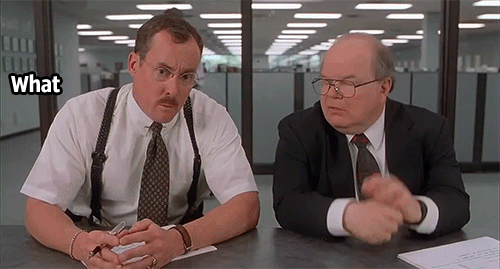I’d been vaguely aware that things were not looking so good at my old gig for a couple of months. Whispers of layoffs seeped into almost every conversation. The company let go of dozens of people a year before I started, and while we were told that we were in the up and up again, things began to look grim when numbers highlighted in red were projected onto the wall during company-wide meetings. Yet I was so busy volleying work orders left and right that my murky future with the company was easy to overlook. I’d gotten great feedback from managers and was given more responsibility in the weeks leading up to getting cut; from training a new developer, to learning .NET, to managing our multiple internal websites, in addition to helping relieve some of the backlog of A/B tests that needed to be run for clients. I’d been so focused on putting a dent on my queue and compartmentalized so well that when I did get that ominous email summoning me to the company conference room, it was a shock, despite all the warnings.
I consoled myself by remembering that I wasn’t alone. Even with unemployment rates reaching a stable point in the United States, the tech sector still saw some newsworthy layoffs in the past year. Everyone from the long-time tech behemoths all the way to much-loved newcomers were affected. Microsoft let go of of 3000 to 5000 people. Etsy laid off 15 to 20 percent of its workers. There was also Intel, Oracle, Twitter, Blue Apron, Stack Overflow--and the list goes on. So for technology workers, it’s not uncommon to end up in a situation that feels like a dark comedy:

The reality of the situation is that no company is immune from economic chaos and volatility. While some places are successful in doing their due diligence by cutting costs before resorting to workforce reduction, other companies may come to the conclusion that there’s no other choice. Unfortunately, my former organization was the latter. I was laid off without any severance and all my accumulated PTO gone. It was a tough, stressful event for people on both sides of the table.
In these situations, all anyone can ever do is to stay proactive. I spent my evenings updating my resume and taking inventory of new skills I’ve learned. I made sure to keep my GitHub heat map green by going through some tutorials, and building small projects. I also woke up a little earlier than usual every morning to solve a few problems in CodeWars and Project Euler. Finally, I looked into companies I thought were interesting, and kept a spreadsheet of places I applied to.
During my search, my thoughts kept going back to the folks I’d left behind and the fellow developers in my team who also got cut. I kept asking myself, “What if I never find a team like this again?” It was devastating to realize that I wouldn’t be able to come back the next day and see the guys, all of whom were some of the kindest people I’ve met and I considered to be my friends. They were my first real ‘dev team.’ Before them, I had only freelanced as a web developer/designer, while working full-time for a nonprofit. I was aware of the hazards of working in the tech industry, but my old team smashed my nervous expectations with their overwhelming support and with all the time they spent making sure I succeeded in my career. Because of this, I prioritized finding a new workplace that had an amazing and supportive organizational culture.
A few days into post-layoff and after a handful of interviews, I got the email for a team call with Chromatic. In between sending out dozens of applications, fielding emails and phone calls from random recruiters in cities I’d no intention of ever moving to, I was ecstatic to hear back from them. As I learned more about the company, I realized that it had the kind of culture I was looking for, and that the partners valued it as much as I did. In addition, Chromatic checked off some of the other things on my priorities list, including:
- Location independence
- Fostering a collaborative community where developers enthusiastically help one another
- The opportunity to work on cool technology
I met the whole team virtually and found that they were across the map, with folks all around the US and Europe. During my interviews, I was happy to hear how no one in the team ‘goes it alone’ and everyone helps each other. I also learned a little bit about the the interesting technical challenges many of the folks in the Chromatic team get to solve through their numerous posts available online. Most importantly, I found that I vibed well with everyone, making me feel that this would be a good crew with which to sail the internet seas.
It has been a few months since I started with Chromatic as a Front-End Designer/Developer, and becoming a full-time remote worker has completely changed my lifestyle. My days no longer consist of sitting in rush hour traffic, pumping carbon emissions into the atmosphere, and spending hours of commute time constantly on edge as I navigate highways under neverending construction. Being able to work from anywhere also took the complication out of having to take PTO (Paid Time Off) just to see my family during the holiday season. I no longer had to figure out if I ‘accrued’ enough days. I was able to just take a flight when I needed and avoid the worst days to travel. Another perk with remote work that is not often talked about is safety. In past gigs, I’ve had to work late nights and I’d sometimes be the only one on the floor or the building and felt unsafe. Now, I can work flexible hours from the comfort of my home, helping me avoid situations where I’d be forced to walk through a dark parking lot or wait at a train station by myself.
Looking back, my situation reminds me of new growth after a forest fire. When the heat and pressure of a fire reaches a tipping point, seed pods explode and scatter. They germinate and start growing into little seedlings on the forest floor, eventually becoming the next generation of trees. The process is a perfect metaphor for how bad things sometimes happen in order to clear the way for good things to come. My layoff experience was one of the least ideal out there, with no warning. It felt awful and it made me wonder if being treated as expendable body was a fact of life. Yet, just like new growth, this common life experience opened up an amazing next step for my career, and for that I’m ever so grateful.


